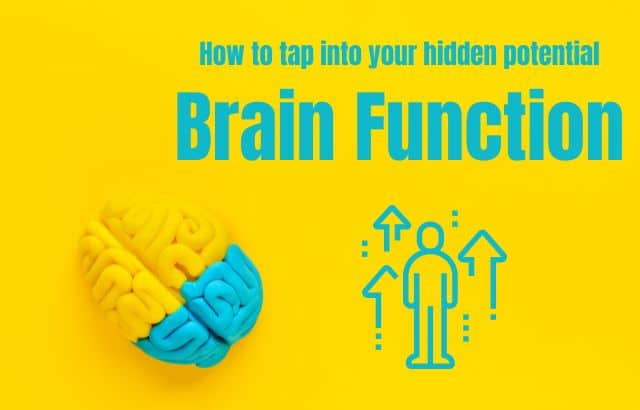In the ever-evolving world of personal development, one of the most intriguing areas of exploration is the brain’s potential. How can we unlock and harness this potential to achieve our goals and lead more fulfilling lives? In this blog post, we’ll explore practical ways to tap into your hidden brainpower and answer some frequently asked questions on the topic.
Table of Contents
What is Brain Potential?
Brain potential refers to the latent capacity of the brain to improve its performance, learn new skills, and enhance overall cognitive function. This concept encompasses various aspects such as neuroplasticity, cognitive enhancement, and mental resilience.
Brain Function: How to Tap into Brain Potential

- Brain Function Understanding: Do you ever feel like you’re not reaching your full potential? The good news is that your brain has the capacity for growth and change throughout your life.
- By understanding how your brain works and implementing certain strategies, you can unlock your hidden abilities and achieve your goals.
- This guide will provide you with the tools you need to tap into your full potential.
Tap into Brain Potential -Neuroplasticity: How Your Brain Can Change.

- Neuroplasticity is the ability of the brain to change and adapt throughout a person’s life.
- This means that the brain can form new neural connections and pathways, and even reorganize itself in response to new experiences and learning.
- By understanding the science of neuroplasticity, you can take advantage of your brain’s capacity for growth and change to unlock your full potential.
The Power of Positive Thinking: How Your Mindset Affects Your Potential.

- Unlock your true potential-Your mindset plays a crucial role in unlocking your full potential.
- A positive mindset can help you overcome obstacles, stay motivated, and achieve your goals.
- On the other hand, a negative mindset can hold you back and limit your potential.
- By practicing positive thinking and focusing on your strengths and abilities, you can tap into your brain’s capacity for growth and achieve great things. Replace any story of limitation to a story of success.
Developing New Skills: Tap into Brain Potential

- Developing new skills is a key component of unlocking your full potential.
- But did you know that training your brain is just as important as practicing the skill itself?
- By engaging in activities that challenge your brain, such as learning a new language or playing a musical instrument, you can strengthen neural connections and improve cognitive function.
- This will not only help you learn new skills faster, but also improve your overall brain health and capacity for growth.
Overcoming Limiting Beliefs: How to Break Free from Negative Thought Patterns.

- Limiting beliefs can hold us back from reaching our full potential.
- These negative thought patterns can be deeply ingrained and difficult to overcome, but it is possible with the right mindset and tools.
- One effective method is to challenge these beliefs by questioning their validity and replacing them with positive affirmations.
- It’s also important to surround yourself with supportive people and seek professional help if needed.
- By breaking free from limiting beliefs, you can unlock your true potential and achieve your goals.
Creating a Growth Mindset: Tap into Brain Potential

- A growth mindset is the belief that your abilities and intelligence can be developed through hard work, dedication, and perseverance.
- This mindset is essential for unlocking your full potential and achieving your goals.
- To cultivate a growth mindset , start by embracing challenges and viewing them as opportunities for growth.
- Learn from your mistakes and failures, and don’t be afraid to take risks.
- Surround yourself with people who inspire and motivate you, and seek out new experiences and learning opportunities.
- With a growth mindset, you can tap into your brain’s capacity for growth and achieve your full potential.
Hirav Shah’s Insights: Frequently Asked Questions on Tap into Brain Potential

1. What is Neuroplasticity and How Does It Relate to Brain Potential?
Neuroplasticity refers to the brain’s ability to reorganize itself by forming new neural connections throughout life. This means that the brain can adapt and change in response to learning, experience, and injury. By engaging in new activities or learning new skills, you can harness neuroplasticity to enhance your brain’s potential.
2. Can Cognitive Training Improve My Brain Function?
Yes, cognitive training can improve brain function by enhancing specific cognitive abilities such as memory, attention, and problem-solving skills. For example, apps and games designed to train your brain can provide exercises that target various cognitive skills. However, it’s important to combine these exercises with other healthy lifestyle practices for optimal results.
3. How Does Diet Affect Brain Function?
A well-balanced diet provides the necessary nutrients that support brain health. Nutrients such as Omega-3 fatty acids, antioxidants, and vitamins play crucial roles in maintaining cognitive function and protecting against neurodegenerative diseases. For instance, studies have shown that a diet high in fruits and vegetables can be associated with better cognitive performance and a lower risk of cognitive decline.
4. What Role Does Sleep Play in Brain Health?
Sleep is vital for cognitive functions such as memory consolidation, learning, and emotional regulation. During sleep, the brain processes and stores new information, making it easier to recall later. Lack of sleep can impair cognitive functions and increase susceptibility to mental health issues.
5. How Can Stress Impact My Brain’s Potential?
Chronic stress can lead to changes in brain structure and function, affecting memory, learning, and emotional regulation. High levels of stress hormones, such as cortisol, can damage brain cells and impair cognitive abilities. Managing stress through relaxation techniques and self-care can help protect and enhance brain function.
Practical Examples of Unlocking Brain Potential

Example 1: Improving Memory through Mental Challenges
Jane, a marketing executive, wanted to boost her memory to manage her increasing workload. She started playing memory-enhancing games and learning a new language. Over time, she noticed significant improvements in her ability to recall information and perform complex tasks more efficiently.
Example 2: Enhancing Creativity through Diverse Experiences
Michael, a graphic designer, sought to enhance his creativity. He began exploring new hobbies, such as painting and writing poetry, which provided fresh perspectives and inspired innovative ideas in his professional work.
Conclusion

Tapping into your brain’s hidden potential is an ongoing journey that involves a combination of lifestyle choices, mental exercises, and stress management. By incorporating regular physical activity, a balanced diet, adequate sleep, mental challenges, and stress-reducing techniques, you can unlock new levels of cognitive function and achieve your personal and professional goals.
Embrace these strategies and start your journey towards realizing your brain’s full potential today!
Feel free to share your experiences or ask further questions in the comments below. Your brain’s potential is waiting to be unlocked!










